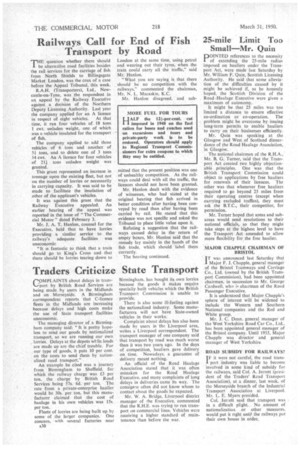Railways Call for End of Fish Transport by Road
Page 32

If you've noticed an error in this article please click here to report it so we can fix it.
E question whether there should be alternative road facilities besides the rail services for the carriage of fish from North Shields to Billingsgate Market. London, was the crux of a case before the Appeal Tribunal, this week. R.A.H. (Transporters), Ltd., Newcastle-on-Tyne, was the respondent in an appeal by the Railway Executive against a decision of the Northern Deputy Licensing Authority. Last year the company applied for an A licence in respect of eight vehicles, At that time, it ran four vehicles of 18 tons 1 cwt. unladen weight, one of which was a vehicle insulated for the transport of fish.
The company applied to add three vehicles of 6 tons and another of 54 tons. and to delete one of 3 tons 14 cwt. An A licence for four vehicles of 211 tons unladen weight was granted.
This grant represented an increase in tonnage upon the existing fleet, but not on the number of lorries or necessarily in carrying capacity. It was said to be made to facilitate the insulation of other of the applicant's vehicles.
It was against this grant that the Railway Executive appealed. An earlier hearing of the appeal was reported in the issue of "The Commercial Motor" dated February 3.
Mr. J. A. T. Hanlon, counsel for the Executive, held that to have lorries providing a similar service • to the railway's adequate facilities was uneconomic
"It Is fantastic to think that a train should go to King's Cross and that there should be lorries tearing down to
London at the same time, using petrol and wearing out their tyres, when the train could carry all the traffic," said Mr. Hanlon.
"Wbat you are saying is that there should be no competition with the railways," commented the chairman, Mr. N. L. Macaskie, K.C.
Mr. Hanlon disagreed, and sub mitted that the present position was one of unhealthy competition. As the railways could deal with all the traffic, the licences should not have been granted, Mr. Hanlon dealt with the evidence of witnesses, who had stated at the original hearing that fish arrived in better condition after having been conveyed by road than after having been carried by rail. He stated that this evidence was not specific and asked the Tribunal to place little value upon it.
Refuting a suggestion that the railways caused delay in the return of empty boxes, Mr. Hanlon said that the remedy lay mainly in the hands of the fish trade, which should label them correctly.
The hearing continued.




























































































